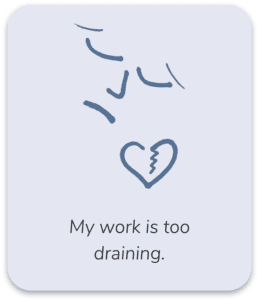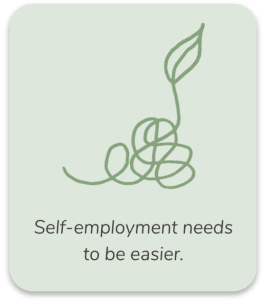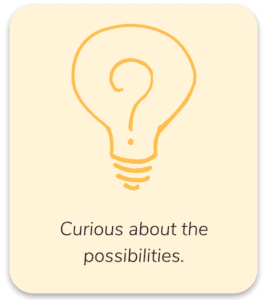The more you learn about introversion and extroversion, the more you might realize you’ve misunderstood these concepts. A little quiz on social media is not enough to know.
It’s important to start with this: there’s no good or bad type. But it’s useful to know which way you lean so let’s go over this.
Many people make assumptions about their type and often it’s wrong. The best way to know is with an accurate assessment, and I offer some suggestions below.
Learning I was an introvert was one of the most important things I’ve ever done for finding fulfillment and ease in work, life, and love.
I promise it matters that you know your type because… when you spend more time doing things in line with your type, you feel energized and can unleash your gifts more easily. If you spend more time doing things against your type, you feel drained and you’re less effective. Been there!”
~Val Nelson, Coach for Introverts
Introvert, Extrovert, Ambivert?
You have probably heard of the terms introvert and extrovert and recently more people are using the term ambivert as probably popularized on social media. (I define introvert and extrovert here.)
Ambivert is meant to indicate being right in the middle on the introvert-extrovert spectrum. The truth is we all have both introverted and extroverted sides in us, and we all need social time and quiet time. As a result, too many people are self-identifying with the “ambivert” label, by mistake. Being right in the middle on the spectrum is probably not existent.
It is most likely that you lean more introverted or lean more extroverted by nature, even if only slightly leaning.
By the way, I have discovered that people who relate strongly to both introverted and extroverted tendencies might be extroverted and highly sensitive. And that can be a big Aha!
Do Assessments Put You in a Box?
All this type stuff is according to psychology researchers. The research and attempts to define and quantify these terms are ongoing and not set in stone.
Consider these terms a framework to use as it’s useful for you, but not to box yourself in. You are far more than someone who leans introverted or extroverted, but it still can be one helpful piece of the puzzle.
Here are 2 options to discover your type:
 1. Myers-Briggs Type Indicator (MBTI)
1. Myers-Briggs Type Indicator (MBTI)
MBTI is one of the most research-based tools for assessing where you fit on an introvert-extrovert spectrum.
It’s also great for understanding other parts of your personality like how you make decisions, and how you get things done. The official, most accurate, version is done in the context of working with a professional who can help make sure it is accurate.
You can take a free online assessment based on MBTI here for a good guess at your type.
Contact me if you want to schedule a session (for a fee) to discuss the results and how it applies to your life and work. (Mention this page when you send me a note.)
2. Quick Introvert-Extrovert Quiz
Here’s a quick quiz, below, to assess introversion or extroversion. “This is an informal 12 question quiz, adapted from Quiet by Susan Cain, based on characteristics of introversion commonly accepted by contemporary researchers.”
++++++++++++++++
“The Quiet Quiz”
[Reprinted with permission from Susan Cain. Original source is here.]
This quiz is primarily designed for assessing introvert tendencies.
Note which ones feel most true or false for you. Go with your gut.
- I prefer one-on-one conversations to group activities.
- I often prefer to express myself in writing.
- I enjoy solitude.
- I seem to care about wealth, fame, and status less than my peers.
- People tell me that I’m a good listener.
- I’m not a big risk-taker.
- I enjoy work that allows me to “dive in” with few interruptions.
- I like to celebrate birthdays on a small scale, with only one or two close friends or family members.
- People describe me as “soft-spoken” or “mellow.”
- I prefer not to show or discuss my work with others until it’s finished.
- I tend to think before I speak.
- I often let calls go through to voice-mail.
Answer Key:
- If you answered the majority of questions TRUE, you probably lean more introverted.
- If you had 6 of each, you’re near the middle and would need a more formal assessment to see which way you lean.
- If you had more FALSE answers, you probably lean more extroverted.
Now What Does Your Type Mean for You?
Now that you feel more confident about your “type,” take a little time to learn what it really means. Otherwise there’s no point in knowing. A deeper look could pay off in career and life happiness.
Here’s a good starting place for learning about introversion, and extroversion. Even if you think you understand it, read some more anyway because there are so many misconceptions. It’s probably not what you think it is.
If you confuse introversion and shyness, or wonder how they’re connected, start here:
Shyness and Introversion: The differences and the connection
If you wonder about the connection with Confidence, check this out:
Do You Confuse Extroversion with Confidence?
Career connection?
Best Careers for Introverts
or
Self-employment Ideas for Introverts
Questions? You can comment on the posts listed above and I’ll do my best to answer there soon.





